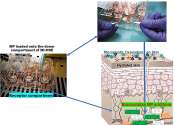Public health is "the science and art of preventing disease, prolonging life and promoting health through the organized efforts and informed choices of society, organizations, public and private, communities and individuals." (1920, C.E.A. Winslow)[citation needed] It is concerned with threats to the overall health of a community based on population health analysis. The population in question can be as small as a handful of people or as large as all the inhabitants of several continents (for instance, in the case of a pandemic). Public health is typically divided into epidemiology, biostatistics and health services. Environmental, social, behavioral, and occupational health are also important subfields.
There are 2 distinct characteristics of public health:
1. It deals with preventive rather than curative aspects of health
2. It deals with population-level, rather than individual-level health issues
The focus of public health intervention is to prevent rather than treat a disease through surveillance of cases and the promotion of healthy behaviors. In addition to these activities, in many cases treating a disease may be vital to preventing it in others, such as during an outbreak of an infectious disease. Hand washing, vaccination programs and distribution of condoms are examples of public health measures.
The goal of public health is to improve lives through the prevention and treatment of disease. The United Nations' World Health Organization defines health as "a state of complete physical, mental and social well-being and not merely the absence of disease or infirmity."









